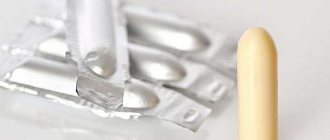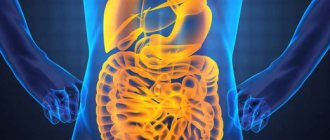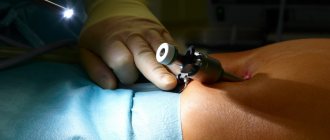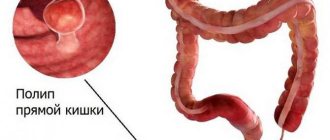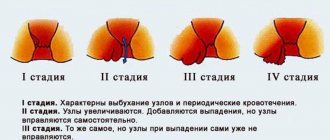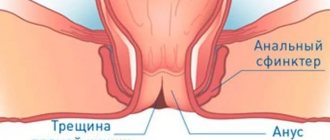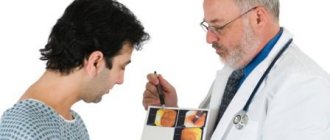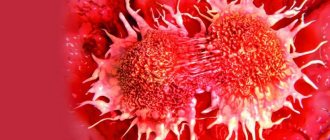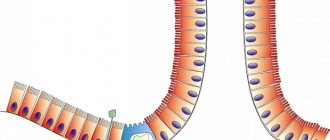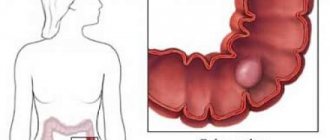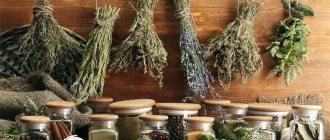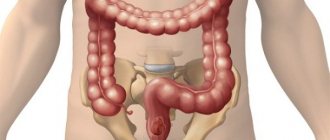Proctitis – inflammation of the rectal mucosa. Often proctitis is combined with inflammatory changes in the sigmoid colon, proctosigmoiditis.
Various factors are important in the development of proctitis, taking into account the following:
• Alimentary proctitis, resulting from excessive consumption of spicy foods, spices, and large doses of alcohol; • Gonorrheal proctitis; • Congestive proctitis, observed in people suffering from constipation, against the background of venous stagnation in the wall of the rectum and trauma to its mucous membrane; • Radiation proctitis, which is a consequence of radiation therapy for malignant tumors of the pelvic organs; • Parasitic proctitis caused by dysenteric amoebas, trichomonas, balantidia. • The development of proctitis can be promoted by hypothermia, diseases of the rectum and neighboring organs, hemorrhoids, anal fissure, paraproctitis, abscess of the pouch of Douglas, prostatitis, cystitis, vulvovaginitis, etc.
Rules for the treatment of proctitis: basic requirements
The effectiveness of proctitis therapy depends on the causes that led to this pathology and the form of the disease. In case of chronic proctitis without exacerbation, the patient is recommended to modify the lifestyle:
- increased physical activity;
- rejection of bad habits;
- proper nutrition;
- drug therapy if necessary.
All of the above requirements can be met on an outpatient basis; hospitalization is not required.
In case of a sharp exacerbation or complication of proctitis, medical care may be required in an inpatient setting, where treatment is carried out under the supervision of a physician.
Features of treatment of proctitis on an outpatient basis at home
Typically, proctitis is treated at home; outpatient methods are prescribed that do not require special knowledge and skills. After examination and the necessary additional examination, therapy is prescribed, including:
- bed rest;
- diet;
- hygiene procedures;
- etiopathogenetic and symptomatic treatment.
Important! In the acute period, bed rest is prescribed. After relief of acute symptoms, physical activity is allowed. Staying in a sitting position is sharply limited.
The diet for inflammation of the rectum must be strictly followed. Limited to:
- coarse fiber;
- alcohol of any strength;
- spicy seasonings;
- fried, fatty, smoked food.
Prohibited Products
Nutritionists recommend limiting or completely eliminating fiber-rich plant products and cereals from the diet. It is also contraindicated to consume food that enhances the secretion of functional glands, takes a long time to digest and causes fermentation processes. In the diet of primary proctitis or in the acute stage, it is recommended to exclude a number of foods.
- Rich broths, fatty meats and fish, pickles and marinades, semi-finished products, sausages, smoked meats, fast food.
- Pasta, porridge from pearl barley, wheat, barley, legumes.
- Whole milk or in the form of soups, as well as its derivatives - sour cream, cream.
- Fried or hard-boiled eggs, mushrooms.
- Baked goods, baked goods, fresh bread, dried fruits, sweets - honey, jam, sweets.
- Products containing fiber - fresh vegetables, herbs, wholemeal bread or with seeds, bran.
- Black coffee or with milk, kvass, carbonated and alcoholic drinks.
Review of drugs and rules for their use in diseases
Treatment of proctitis should be comprehensive. Therapy includes the use of several groups of drugs acting on different stages of pathogenesis, as well as their use in different dosage forms (ointment, suppositories, tablets, injection solutions). Physiotherapeutic methods and diet therapy are prescribed. They are included in the treatment plan and accelerate the improvement of the condition, in mild cases they help get rid of pathological symptoms forever.
Candles
Rectal suppositories act locally, directly on the inflamed rectal mucosa. Their list is extensive, the mechanism of action is different. Depending on the composition they contribute to:
- intestinal cleansing (Evacue, Bisacodyl);
- mucosal regeneration (suppositories with methyluracil, propolis, sea buckthorn);
- pain relief (Salofalk, Relief);
- reducing inflammation (Proctosan, Natalsid).
Natalsid suppositories are an anti-inflammatory, hemostatic agent.
Used for exacerbation of hemorrhoids and proctitis. Medicines in the form of suppositories have advantages over other forms:
- do not irritate the gastric mucosa;
- do not affect the entire body;
- do not have systemic side effects;
- are quickly absorbed and act.
Important! Despite the local effect on the mucous membrane of the final intestine, these drugs are effective and, when used correctly, give a quick positive result. For proctitis combined with internal hemorrhoids, similar ointments are used.
Antibiotics
Drug treatment of proctitis is carried out using antibacterial drugs. They are prescribed in cases where proctitis is caused by an infectious agent. The antibiotic is selected based on the culture result and the sensitivity of the identified pathogen to a specific drug. These medications:
- contribute to the complete release of the intestines from the infectious agent;
- cure inflammation;
- relieve itching and pain;
- prevent further development of infection.
Reviews
Dear readers, you can leave your opinion about the correct diet for proctitis in the comments (form below)
Irina, 29 years old:
After suffering from an illness and a course of antibiotics, I developed an unpleasant sensation in the anus and pain in the location of the tailbone. During the examination, the doctor diagnosed proctitis, and chronic proctitis. He prescribed medications and a strict diet, and as a result, the stool improved and the condition improved. However, as soon as you break your diet and eat something fried or spicy, the pain returns. I’m very curious, how long will it take to observe the food restrictions?
Valentina, 34 years old:
It’s easy for me to stick to a diet, it greatly relieves my condition, since proctitis was diagnosed a long time ago, I got it after gastritis. I can’t completely get rid of the disease, but following a diet, I almost don’t feel its presence, in addition, I manage to maintain my figure and not gain weight.
Additional therapies
In addition to drug therapy, local treatment is used. It includes:
- cleansing enemas;
- therapeutic microenemas with the introduction of various oils or medicines;
- sitz baths;
- warm shower on the anorectal area;
- radon baths;
- therapeutic exercises;
- sanatorium treatment.
Cleansing enemas
Prescribing cleansing enemas is effective for proctitis that occurs with pain. Pain and discomfort are caused by the impossibility of timely bowel movements due to constipation and inflammatory phenomena. To eliminate them, cleansing enemas are used. The result comes immediately or after a certain time.
Enemas, which act immediately, stimulate intestinal activity through temperature or fluid volume. Use 0.5-1 liters of water at a temperature of 23°C. Such enemas are used for intestinal atony. The water temperature should be cool. If pain in the intestines is caused by spastic constipation, use warm water: cold water causes spasm and increased pain. It is heated to 36°C. With the rapid introduction of a large volume of liquid under pressure, a spastic contraction of the intestines and a rapid release of liquid out also occur, so water must be administered without pressure, evenly, avoiding its premature release.
Enemas with a delayed effect are based on the effect of the injected liquid, which manifests itself after a certain time. For this purpose:
- medicinal plant oil or petroleum jelly in an amount of 200 ml;
- water-oil suspension with a volume of 500 ml or more.
Important! Cleansing enemas with oil are more effective. They are taken at room temperature or heated to 32°C. The oil in the intestines, under the influence of negative pressure, spreads to its ascending parts, gently separates solid feces from the wall, and stimulates peristalsis. The procedure is carried out using an Esmarch mug or a syringe. Care must be taken to keep the injected fluid in the intestinal lumen as much as possible.
Sitz baths with potassium permanganate
Sitz baths using a 0.01% solution of potassium permanganate (potassium permanganate) are recommended to relieve inflammation in the rectum. This is the most popular home treatment method. The procedure lasts 20-25 minutes. The compound is an active antiseptic. Has an effect:
- astringent;
- drying;
- annoying;
- cauterizing.
Lifestyle recommendations
For the treatment of any type of proctitis, there are a number of general recommendations that the patient must follow:
- Quitting bad habits. Alcohol and smoking negatively affect the functioning of the body's digestive system.
- Divided nutrition becomes a priority. Food portions become smaller, and food intake becomes more frequent. Products do not accumulate in the stomach. The process of rotting does not occur.
- Medicines aimed at correcting the situation with going to the toilet should be selected strictly individually. The danger of laxatives is that they irritate the intestinal mucosa. At the same time, inflammation progresses. In such cases, traditional methods come to the rescue. An effective remedy is a decoction of plantain seeds. Due to the formation of a composition close in consistency to mucus, the bolus of food moves more easily through the intestines.
How to treat severe proctitis in a hospital: conservative methods
Treatment aimed at quick results and prevention of complications is prescribed by a proctologist after examination and diagnostic measures. Typically, this pathology is effectively treated on an outpatient basis. But in severe cases, when the disease is advanced, the patient is hospitalized in a hospital.
Indications for stay in the proctology department are severe forms of acute proctitis:
- catarrhal-purulent;
- erosive;
- ulcerative;
- ulcerative-necrotic;
- polyposis.
Therapy in a specialized department has several advantages over treating proctitis at home. These include:
- maintaining the necessary diet;
- inability to continue an unhealthy lifestyle;
- ensuring the necessary examination and proper treatment under the strict supervision of specialists.
If the patient's condition allows him to be treated with conservative methods, complex therapy is prescribed. In addition to diet and bed rest, the following are prescribed:
- Etiological treatment includes, depending on the results of bacteriological studies, the prescription of antibiotics for proctitis caused by pathogenic microflora, antiviral drugs, and anthelmintics.
- Antispasmodics - to relieve pain arising from spastic contraction of the smooth muscles of the rectum, facilitate bowel movements, and eliminate false urges to defecate.
- Analgesics - if necessary, combined with antispasmodic drugs.
- Means to accelerate the recovery of damaged tissues are usually used topically, in the form of suppositories with methyluracil and sea buckthorn oil. With their help, regeneration and metabolic processes are improved, and the inflammatory process is reduced.
- GCS - hormonal drugs - are prescribed in severe cases of certain types of proctitis.
- Antihistamines - if an allergic component is present.
- Local methods (sitz baths, cleansing enemas to empty the intestines of feces and microenemas with medicinal herbs or medications). Chamomile, calendula, collargol, potassium permanganate, and vegetable oils are successfully used for these purposes.
Menu for the week
The weekly dietary menu for proctitis should look like this:
Currently reading: Causes of acute proctitis, features of the disease and proper treatment
First day
Breakfast: protein steam omelette, a small portion of semolina porridge without milk, tea.
Lunch: light chicken broth, boiled beef minced in a meat grinder, vegetable puree, compote.
Dinner: rice porridge without milk, low-fat cottage cheese with a spoonful of sour cream with a piece of stale white bread, kefir.
Second day
Breakfast: a portion of low-fat cottage cheese, a stale bun, natural yogurt.
Lunch: pureed vegetable soup, boiled fish, juice.
Dinner: a portion of boiled chicken with a side dish of boiled potatoes, compote.
The third day
Breakfast: boiled rice porridge, yesterday's bun, a portion of kefir.
Lunch: vegetable puree soup, minced meat balls, jelly, a piece of white bread.
Dinner: semolina porridge, baked apple, yesterday's bun, tea.
Fourth day
Breakfast: boiled egg, curd mass, natural yogurt, white bread.
Lunch: low-fat broth, steamed meatballs with a side dish of boiled carrots, yesterday's pastries, rosehip broth.
Dinner: a portion of boiled fish with a side dish of stewed cabbage, vegetable juice, bread.
Fifth day
Breakfast: cottage cheese casserole, sour cream, white bread, baked apple.
Lunch: broth with chicken medallions, apple compote, bun.
Dinner: a portion of boiled beef minced with mashed potatoes, tea with lean cookies.
Sixth day
Breakfast: semolina porridge with water, bun, kefir.
Lunch: pureed vegetable soup, meat souffle with semolina, stewed cabbage with boiled chicken, jelly.
Dinner: steamed fish with carrots, cottage cheese, apple and carrot juice, bread.
Seventh day
Breakfast: protein omelet, baked apple, boiled carrots, compote.
Lunch: chicken broth, minced meat with a side dish of boiled cabbage, tea, bread.
Dinner: steamed fish, side dish of rice, rosehip drink, yesterday's bun.
Since patients with proctitis should eat small portions and at least five times a day, between main meals it is allowed to eat a banana, boiled chopped vegetables in the form of a salad, a baked apple, yogurt or a portion of sour cream. Just like overeating, it is not recommended to feel hungry when you have proctitis.
Surgical methods for treating proctitis: possible operations
In severe cases with complications, radical treatment is necessary. Indications for it in an adult are:
- ineffectiveness of conservative therapy;
- paraproctitis - transition of the inflammatory process to fatty tissue (excision of the formed abscess is required);
- rectal strictures - local narrowing of its lumen as a result of scarring at the site of inflammation;
- changes in the mucous membrane caused by a neoplasm in the intestine;
- UC (nonspecific ulcerative colitis).
Important! Complications are equally common in men and women. Surgery is rarely performed on a child, in exceptional cases. Paraproctitis is most often treated surgically: the abscess is opened and drained. The decision is made by the doctor, taking into account the severity of the process and the lack of results from antibacterial therapy. Surgery is a last resort in treating complications.
Diet for ulcerative colitis
A diet in the presence of ulcerative colitis can improve the functions of the digestive and excretory systems, resulting in an improvement in the general condition of the patient. As a result of its observance, damage to the mucous membrane of the stomach and intestines is restored faster, and its ability to resist the aggressive effects of an unfavorable environment increases. As a rule, compliance with certain nutritional requirements for this disease lasts about five weeks, but with a particularly severe nature of the disease it can last up to several months. Food portions should be small, meals should be divided, and food should be prepared correctly.
- All dishes must be steamed or boiled.
- The temperature of prepared dishes should be comfortable.
- The number of meals should not be less than five times a day.
- Don't eat after nine in the evening.
- Stick to small portions of food.
- Provide sufficient protein foods.
- If possible, all foods consumed should be natural and fresh.
The menu of a patient with ulcerative colitis should include lean meat and poultry, at least one boiled egg per day, you can consume fresh milk for porridge, cottage cheese, but you should avoid fermented milk products.
Forecast
The prognosis of the disease is favorable provided that you consult a doctor in a timely manner and prescribe adequate treatment. During cancer treatment, the patient experiences many unpleasant painful symptoms associated with the characteristics of the therapy. Early radiation proctitis manifests itself acutely, and its signs cannot be ignored. But you should not self-medicate; qualified help is required immediately.
With late post-radiation proctitis, the symptoms are mild, but the threat of complications in the form of stenosis and strictures is much more serious. Surgery may be required. Therefore, at the first signs of a disease accompanying cancer treatment with radiation therapy, it is necessary to contact a proctologist and undergo a course of complex treatment.
The issue of preventing such a specific disease is stopping the development of malignant tumors. In addition, it can be avoided if you use the most modern gentle methods of radiation therapy. But if it cannot be avoided, then it is necessary to at least begin treatment in a timely manner. In general, early radiation proctitis is cured successfully.
We recommend: What is acute peritonitis and what is its danger
